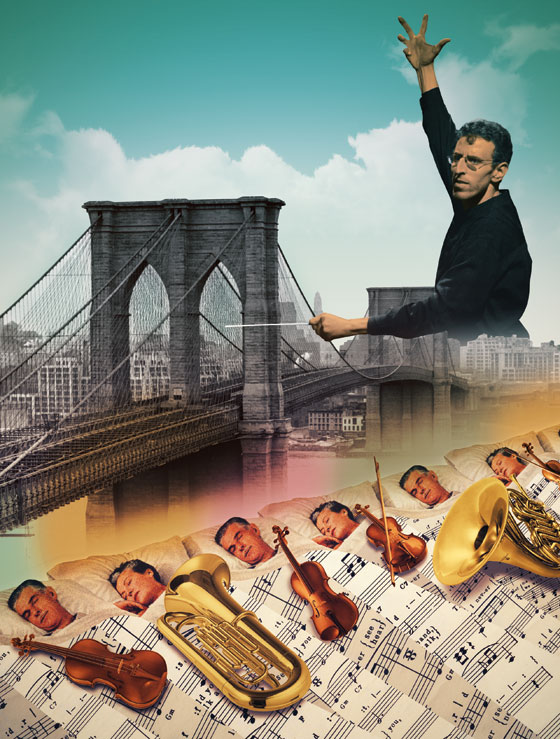
It’s hard to imagine what self-respecting conductor would be crazy enough to go near the Brooklyn Philharmonic, which in recent years has managed to shed its stable budget, its visibility, its subscriber list, and its home. The answer is Alan Pierson, who has led many performances of the Beatles’ all-electronic “Revolution No. 9” transcribed for chamber orchestra but has never conducted, say, Beethoven’s Symphony No. 3. He’s a man who relishes the challenge of reinvention.
Or masochism. “I never thought I would have a job at an institution,” says Pierson, who founded the crackerjack new-music ensemble Alarm Will Sound. “It’s a real pleasure to come into an organization where things are in flux rather than one that’s running smoothly. Expectations are very open.” Ah, the joys of desperation.
The Brooklyn Philharmonic, founded in 1857 (just fifteen years after the New York Philharmonic), has both a history of decline and a pedigree of experimentation, but the 2011–12 season represents a near-total overhaul. Just as New York City Opera is abandoning the expensive precincts of Lincoln Center to become an itinerant company, the Brooklyn Philharmonic last year found itself financially squeezed out of bam. That’s fine with Pierson, who used the rent emergency to germinate a new artistic mission: roaming. “The Brooklyn Phil should be financially viable not by begging for handouts but by making itself beloved and essential in the borough,” Pierson says brightly. “It’s better for us to take the show on the road.” In preparation, Pierson and the orchestra’s small staff spent months scavenging venues, meeting local luminaries, and tailoring programs to fragmented populations.
“There are twenty different Brooklyns,” marvels Pierson, who lives in a Hell’s Kitchen walk-up and previously had only a nodding acquaintance with the vast, polyglot borough. “Going from one neighborhood to another is like traveling to a different world! That’s going to require us to be an artistic chameleon.”
The first of the season’s two demographic and creative leaps is “Russian Cartoon Music” on November 3 at the Millennium Theatre in Brighton Beach, which might just turn out to be a sublime concoction of immigrant culture, Soviet-era nostalgia, popular music by composers like Shostakovich, and musicological curiosity. The other main event comes at the end of the season, in June: a concert in Bedford-Stuyvesant that taps into the neighborhood’s abiding pride in its alumni Lena Horne and Mos Def. The rapper, Pierson, says, “has a vast knowledge of music and was full of ideas for what he wanted to do with an orchestra.”
The overall strategy is to leverage each neighborhood’s enthusiasms to help construct concerts that transcend the parochial. “I want to make sure that each of these programs speaks to the community but also about that community to a larger audience,” Pierson says. He even hazards the hope that the concerts can coax residents of both Brighton Beach and Bed-Stuy to travel to each other’s turf.
This path does not, in all likelihood, bend toward a future of sedate respectability, but Pierson’s antics will nevertheless be watched by a classical-music Establishment that has been facing crises for decades. Trapped in a tight circle of convention, obsessed with dwindling prestige, craving fresh audiences but clinging to old loyalties, unable to translate new technologies into revenue, and bound to an increasingly brittle business model, orchestras have tried all sorts of solutions to their problems—from retrenchment to pops to bankruptcy. Most ensembles covet the kind of close symbioses with their communities that Pierson is pursuing. But few have rejected orthodoxy with such gusto. Rather than hire a rescue specialist, the orchestra’s board gave the job of chief executive to Richard Dare, an investment magnate with zero music experience, and tapped Pierson, whose own mother had qualms: “When I told her I was talking to the Brooklyn Philharmonic, she said, ‘Oh, they’re not going to give you that job.’ ”
That they did is a statement: Better to retool as a modern artistic enterprise and leave the masterwork-buffing to others. On the other hand, Pierson is also going to have to brush up his Beethoven, since the finale of that famous Third Symphony will share a program in Bed-Stuy with Mos Def’s “Life in Marvelous Times,” both of them reworked for the occasion.
It would be tempting to scoff at such hodgepodge programming as just another gimmick, except that Pierson’s Alarm Will Sound has spent ten years bewitching audiences with its own brand of dogged eclecticism and arrangements of electronic music for live players. Pierson does not claim to be assembling a new rule book for the creative orchestral manager; jettisoning authenticity and historical reverence is not a viable plan for most orchestras. But if he can execute his plans with the borough’s trademark flair, that approach might just electrify Brooklyn.
Brooklyn Philharmonic
Season begins Oct. 8.
